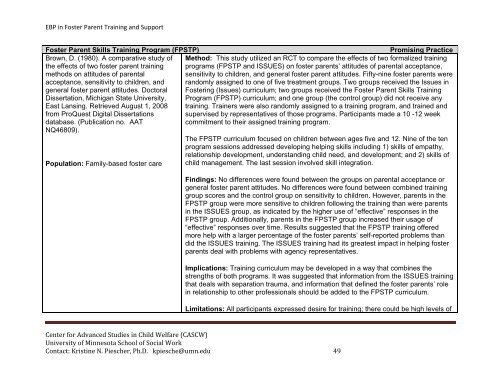Evidence-Based Practice in Foster Parent Training and Support ...
Evidence-Based Practice in Foster Parent Training and Support ...
Evidence-Based Practice in Foster Parent Training and Support ...
You also want an ePaper? Increase the reach of your titles
YUMPU automatically turns print PDFs into web optimized ePapers that Google loves.
EBP <strong>in</strong> <strong>Foster</strong> <strong>Parent</strong> Tra<strong>in</strong><strong>in</strong>g <strong>and</strong> <strong>Support</strong><strong>Foster</strong> <strong>Parent</strong> Skills Tra<strong>in</strong><strong>in</strong>g Program (FPSTP) Promis<strong>in</strong>g <strong>Practice</strong>Brown, D. (1980). A comparative study of Method: This study utilized an RCT to compare the effects of two formalized tra<strong>in</strong><strong>in</strong>gthe effects of two foster parent tra<strong>in</strong><strong>in</strong>g programs (FPSTP <strong>and</strong> ISSUES) on foster parents’ attitudes of parental acceptance,methods on attitudes of parentalsensitivity to children, <strong>and</strong> general foster parent attitudes. Fifty-n<strong>in</strong>e foster parents wereacceptance, sensitivity to children, <strong>and</strong> r<strong>and</strong>omly assigned to one of five treatment groups. Two groups received the Issues <strong>in</strong>general foster parent attitudes. Doctoral <strong>Foster</strong><strong>in</strong>g (Issues) curriculum; two groups received the <strong>Foster</strong> <strong>Parent</strong> Skills Tra<strong>in</strong><strong>in</strong>gDissertation, Michigan State University, Program (FPSTP) curriculum; <strong>and</strong> one group (the control group) did not receive anyEast Lans<strong>in</strong>g. Retrieved August 1, 2008 tra<strong>in</strong><strong>in</strong>g. Tra<strong>in</strong>ers were also r<strong>and</strong>omly assigned to a tra<strong>in</strong><strong>in</strong>g program, <strong>and</strong> tra<strong>in</strong>ed <strong>and</strong>from ProQuest Digital Dissertations supervised by representatives of those programs. Participants made a 10 -12 weekdatabase. (Publication no. AATcommitment to their assigned tra<strong>in</strong><strong>in</strong>g program.NQ46809).The FPSTP curriculum focused on children between ages five <strong>and</strong> 12. N<strong>in</strong>e of the tenprogram sessions addressed develop<strong>in</strong>g help<strong>in</strong>g skills <strong>in</strong>clud<strong>in</strong>g 1) skills of empathy,relationship development, underst<strong>and</strong><strong>in</strong>g child need, <strong>and</strong> development; <strong>and</strong> 2) skills ofPopulation: Family-based foster care child management. The last session <strong>in</strong>volved skill <strong>in</strong>tegration.F<strong>in</strong>d<strong>in</strong>gs: No differences were found between the groups on parental acceptance orgeneral foster parent attitudes. No differences were found between comb<strong>in</strong>ed tra<strong>in</strong><strong>in</strong>ggroup scores <strong>and</strong> the control group on sensitivity to children. However, parents <strong>in</strong> theFPSTP group were more sensitive to children follow<strong>in</strong>g the tra<strong>in</strong><strong>in</strong>g than were parents<strong>in</strong> the ISSUES group, as <strong>in</strong>dicated by the higher use of “effective” responses <strong>in</strong> theFPSTP group. Additionally, parents <strong>in</strong> the FPSTP group <strong>in</strong>creased their usage of“effective” responses over time. Results suggested that the FPSTP tra<strong>in</strong><strong>in</strong>g offeredmore help with a larger percentage of the foster parents’ self-reported problems th<strong>and</strong>id the ISSUES tra<strong>in</strong><strong>in</strong>g. The ISSUES tra<strong>in</strong><strong>in</strong>g had its greatest impact <strong>in</strong> help<strong>in</strong>g fosterparents deal with problems with agency representatives.Implications: Tra<strong>in</strong><strong>in</strong>g curriculum may be developed <strong>in</strong> a way that comb<strong>in</strong>es thestrengths of both programs. It was suggested that <strong>in</strong>formation from the ISSUES tra<strong>in</strong><strong>in</strong>gthat deals with separation trauma, <strong>and</strong> <strong>in</strong>formation that def<strong>in</strong>ed the foster parents’ role<strong>in</strong> relationship to other professionals should be added to the FPSTP curriculum.Limitations: All participants expressed desire for tra<strong>in</strong><strong>in</strong>g; there could be high levels ofCenter for Advanced Studies <strong>in</strong> Child Welfare (CASCW)University of M<strong>in</strong>nesota School of Social WorkContact: Krist<strong>in</strong>e N. Piescher, Ph.D. kpiesche@umn.edu 49
















